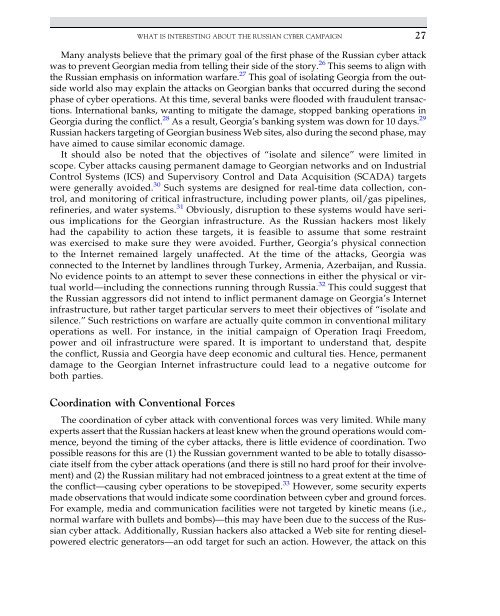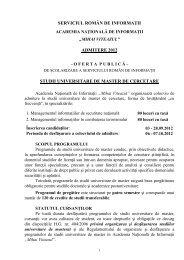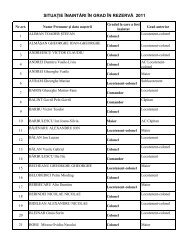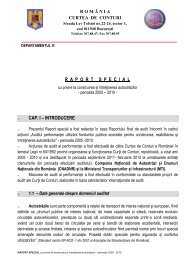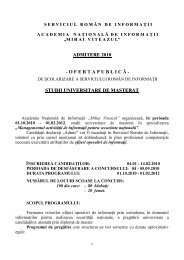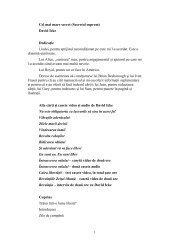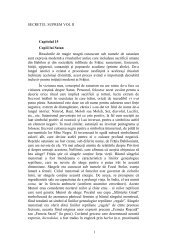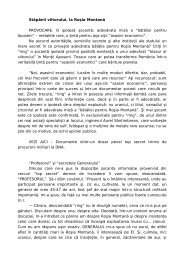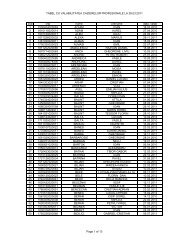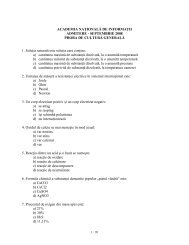Introduction to Cyber-Warfare - Proiect SEMPER FIDELIS
Introduction to Cyber-Warfare - Proiect SEMPER FIDELIS
Introduction to Cyber-Warfare - Proiect SEMPER FIDELIS
You also want an ePaper? Increase the reach of your titles
YUMPU automatically turns print PDFs into web optimized ePapers that Google loves.
WHAT IS INTERESTING ABOUT THE RUSSIAN CYBER CAMPAIGN27Many analysts believe that the primary goal of the first phase of the Russian cyber attackwas <strong>to</strong> prevent Georgian media from telling their side of the s<strong>to</strong>ry. 26 This seems <strong>to</strong> align withthe Russian emphasis on information warfare. 27 This goal of isolating Georgia from the outsideworld also may explain the attacks on Georgian banks that occurred during the secondphase of cyber operations. At this time, several banks were flooded with fraudulent transactions.International banks, wanting <strong>to</strong> mitigate the damage, s<strong>to</strong>pped banking operations inGeorgia during the conflict. 28 As a result, Georgia’s banking system was down for 10 days. 29Russian hackers targeting of Georgian business Web sites, also during the second phase, mayhave aimed <strong>to</strong> cause similar economic damage.It should also be noted that the objectives of “isolate and silence” were limited inscope. <strong>Cyber</strong> attacks causing permanent damage <strong>to</strong> Georgian networks and on IndustrialControl Systems (ICS) and Supervisory Control and Data Acquisition (SCADA) targetswere generally avoided. 30 Such systems are designed for real-time data collection, control,and moni<strong>to</strong>ring of critical infrastructure, including power plants, oil/gas pipelines,refineries, and water systems. 31 Obviously, disruption <strong>to</strong> these systems would have seriousimplications for the Georgian infrastructure. As the Russian hackers most likelyhad the capability <strong>to</strong> action these targets, it is feasible <strong>to</strong> assume that some restraintwas exercised <strong>to</strong> make sure they were avoided. Further, Georgia’s physical connection<strong>to</strong> the Internet remained largely unaffected. At the time of the attacks, Georgia wasconnected <strong>to</strong> the Internet by landlines through Turkey, Armenia, Azerbaijan, and Russia.No evidence points <strong>to</strong> an attempt <strong>to</strong> sever these connections in either the physical or virtualworld—including the connections running through Russia. 32 This could suggest thatthe Russian aggressors did not intend <strong>to</strong> inflict permanent damage on Georgia’s Internetinfrastructure, but rather target particular servers <strong>to</strong> meet their objectives of “isolate andsilence.” Such restrictions on warfare are actually quite common in conventional militaryoperations as well. For instance, in the initial campaign of Operation Iraqi Freedom,power and oil infrastructure were spared. It is important <strong>to</strong> understand that, despitethe conflict, Russia and Georgia have deep economic and cultural ties. Hence, permanentdamage <strong>to</strong> the Georgian Internet infrastructure could lead <strong>to</strong> a negative outcome forboth parties.Coordination with Conventional ForcesThe coordination of cyber attack with conventional forces was very limited. While manyexperts assert that the Russian hackers at least knew when the ground operations would commence,beyond the timing of the cyber attacks, there is little evidence of coordination. Twopossible reasons for this are (1) the Russian government wanted <strong>to</strong> be able <strong>to</strong> <strong>to</strong>tally disassociateitself from the cyber attack operations (and there is still no hard proof for their involvement)and (2) the Russian military had not embraced jointness <strong>to</strong> a great extent at the time ofthe conflict—causing cyber operations <strong>to</strong> be s<strong>to</strong>vepiped. 33 However, some security expertsmade observations that would indicate some coordination between cyber and ground forces.For example, media and communication facilities were not targeted by kinetic means (i.e.,normal warfare with bullets and bombs)—this may have been due <strong>to</strong> the success of the Russiancyber attack. Additionally, Russian hackers also attacked a Web site for renting dieselpoweredelectric genera<strong>to</strong>rs—an odd target for such an action. However, the attack on this


